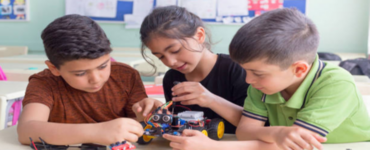Suzanne Gilchrist McCurdy & Holly Krech Thomas Welcome to Volume 41, Issue 1 of MinneTESOL Journal! This issue explores the Science of Reading, student assets, and pedagogy – all of which inform teaching and ultimately student success. As teachers of multilingual learners, it is imperative that we capitalize on the strengths of students, teachers, and curriculum. Please enjoy and share…
Current Issue
Pay attention to this! Demonstratives in university-level academic lectures
Bonnie Swierzbin Demonstratives (this, that, these, those) fundamentally mean “pay attention”. In conversational language, as typically taught in ESL textbooks, demonstratives work with gestures to point listeners to objects, sounds, etc. in the current environment. But in academic lectures, demonstratives often tell listeners to pay attention to more complex entities such as ideas, events, and situations. They create reference chains…
Equity in the language classroom: Embracing gender-just pedagogies for a more inclusive environment
Fernando Lesniak This article highlights the need for gender-just teaching in language education to create classrooms that respect and include all gender identities. It explains how these methods challenge stereotypes, promote equality, and make learning spaces more supportive. Practical strategies and examples are provided to help teachers use gender-inclusive language and foster a sense of belonging for all students. Keywords:…
Co-teaching in secondary mathematics: Teacher perceptions and the impact on student success
Anna Meyer This study explores the effectiveness of co-teaching in improving the academic performance of multilingual learners in mathematics and beyond. Findings demonstrate better academic outcomes, sustained progress, and higher engagement of students in co-taught classes, while teachers involved in the following co-teaching study highlight the benefits of combining language and content instruction. Keywords: co-teaching, co-planning, Language Instruction Education Program…
Implementing multilingual learner strategies within the 5E science framework: Preparing preservice teachers for the diverse classroom
Renee Ullom & Bailey Nafziger Preparing preservice teachers to tailor their science instruction is crucial for ensuring equitable education in their future classrooms. This study explores how preservice teachers used strategies to support multilingual learners, where the strategies were integrated within a unit aligned with the 5E science teaching framework, and how the choices mutually support science learning and second…
Multilingual classroom encounters with science of reading curricular initiatives: Reporting on a year of implementation in Minnesota
Anne C. Ittner, Letitia Basford, Michelle Benegas, & Stephanie DeFrance This study provides a timely look into one school’s first year implementing a Science of Reading-informed literacy curriculum with multilingual learners. Our findings place the perspectives of teachers employing the curricula front and center. Keywords: evidence-based literacy instruction, science of reading, reading policy, implementation Introduction Minnesota is one of 40…
Multiliteracies in action: A flamenco twist on practicing multimodal reader-viewership
Christina Torres & Carmen Toscano-Fuentes This article describes the research-informed design and implementation of an online, multimodal, multiliteracies activity used in a teacher-training telecollaboration exchange between a U.S. and a Spanish university. Qualitative findings from student-provided feedback are provided. Keywords: teacher education, multiliteracies, learning by design, English as a foreign language (EFL), English as a second language (ESL) Multiliteracies for…
Beyond barriers: Recognizing and supporting refugee students’ aspirations in schools
Yacoub Aljaffery The current study highlights the powerful aspirations that refugee students bring with them, emphasizing their resilience, optimism, and hope for a better future. The article advocates for an asset-based approach in education, where the strengths and potential of refugee students are acknowledged and supported to unlock doors of opportunity and success. Keywords: refugee education, asset-based, inclusive education Introduction…
A guaranteed, viable curriculum for all: What would it look like if we worked on “for all”?
Tara Gibbs There are many resources focused on creating a “guaranteed, viable curriculum.” This table lays out steps to use in co-teaching discussions or formal curriculum making processes in order to be intentional and pre-plan to make curriculum accessible “for all.” It includes three focuses: English language (EL), literacy levels, and special education (SPED). Keywords: K-12, EL, SPED, accessible learning,…
Linking the science of reading to writing: A genre-based approach
Angela Froemming & Emily Mattson ESL teachers can leverage their expertise to bridge the Science of Reading and a genre-based approach to writing, supporting multilingual learners in developing language and literacy skills that empower them to read and write effectively across contexts. Keywords: elementary, literacy, writing, science of reading Introduction This article explores the relationship between the Science of Reading…










